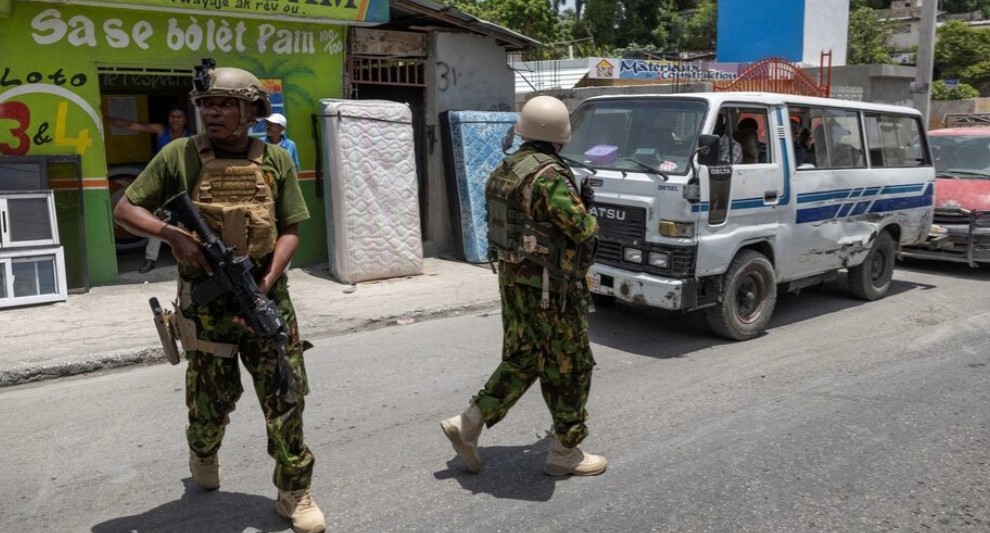UN urged to rethink peacekeeping mandates to tackle organised crime in conflict zones

The findings come at a time when peacekeeping operations in the world are folding, with the last United Nations mission having been deployed in 2014.
The growing threat posed by organised crime in exacerbating violence in countries facing conflict now calls for peacekeeping operations to rethink their mandate, a new report by the Global Initiative Against Transnational Organised Crime (GI-TOC) has appealed.
The report titled "Peacekeeping in retreat; Rethinking how to deal with organised crime in conflict settings" notes that there is a growing, undeniable correlation between organised crime and conflict that continues to be overlooked as peace operations keep off.
More To Read
- Kenyan police officers in Haiti to return home after year-long deployment
- ‘Kenya can’t do it alone’: US urges more nations to join Haiti’s Gang Suppression Force
- Report links corrupt officials to rising criminal networks in Kenya
- Haiti is under a UN arms embargo: So why are 500,000 illegal weapons in circulation?
- Explainer: Details of Haiti’s new UN-backed Gang Suppression Force
- Ruto urges orderly transition in Haiti as Kenyan-led MSS mission nears end
It notes that previous research has found that 'the more affected by conflict a country is, the higher the likelihood of it experiencing reduced levels of resilience to organised crime'.
Therefore, if peace operations do not confront organised crime, who will?
"Experience has shown that if these problems are left unaddressed, they fester, resulting in criminal governance or violent competition for control of illicit economies. Where national police and armed forces are inadequate or complicit, it is armed groups, private military companies or foreign powers that fill the void. This usually leads to protracted instability and suffering for the affected populations," the report states.
The findings, however, come at a time when peacekeeping operations in the world are folding, with the last United Nations mission having been deployed in 2014.
Others have closed or scaled down as others suffer financial cuts, as organised criminals continue showing resilience in their respective strongholds, amongst them Haiti, where efforts to set up another UN mission have been constantly met with objections, as the UN-supported mission led by Kenya continues to be outnumbered and under-resourced.
The organisation calls for the deployment of initiatives that could be used to design strategic approaches to disrupting illicit economies in conflict zones.
Illicit economies
"Regardless of such operational responses, troops and police deployed to peace operations must receive training on the potential impact of illicit economies on their work. They should also have the necessary expertise and resources to monitor illicit activities and criminal actors who could endanger their mission. Furthermore, guidelines are urgently needed to ensure that peacemakers engaged in mediation processes are aware of the environment in which they are operating, the motivations of their interlocutors and the potential hazards that could jeopardise peace processes."
Oftentimes, armed groups and state-embedded actors engaged in illicit activities pose one of the biggest threats to people's security in conflict-affected regions that are rarely recognised.
This threat, according to GI-TOC, does not always manifest as violence; it also takes the form of criminal governance, business models that are a major impediment to peacebuilding and sustainable development.
"One option, as recommended in the Future of Peacekeeping report, is to deploy counter-organised crime missions for fact-finding about criminal markets and actors, and to provide technical expertise and assistance to national institutions. With sufficiently robust mandates, such missions could also carry out executive action such as gathering evidence and making arrests, with the necessary consent from the host state," the report suggests.
Alternatively, it proposes that peace operations or political missions include a sufficiently trained and equipped component to monitor and provide strategic advice on reducing the threat posed by organised crime.
"These teams could be staffed by experts with specialised skills, including threat assessment, financial intelligence and criminal justice reform. This would allow new types of peace support actors to be involved, including those from specialised crime-fighting agencies, such as INTERPOL; experts in fighting economic and financial crimes, such as Italy's Guardia di Finanza; gendarmerie; and civil society actors."
Counterorganised crime teams
It adds that at a minimum, counterorganised crime teams should enhance force protection and strengthen national crime-fighting capacity and protect civilians, a core focus of the UN peacekeeping missions.
It further suggests that even in the absence of a mandate or willingness to deploy a peace operation, such counter-organised crime teams could be dispatched at the request of UN member states or regional organisations on an ad hoc basis.
These teams, the report says, could build on the experience of specialized police teams and draw on lessons learned from UN Panels of Experts that have been used to monitor sanctions and analyze regional conflicts to help map criminal markets and actors, and collect evidence of activities and offences, such as human rights violations while integrating crime prevention or social resilience initiatives into stabilization and peacebuilding processes.
"As the crisis in Haiti makes clear, the international community is at a critical juncture. It must change its approach to addressing the impact of illicit economies on peace and security. It is time to acknowledge that the future of peacemaking, peacekeeping and peacebuilding will be shaped by organised crime."
Top Stories Today
















































